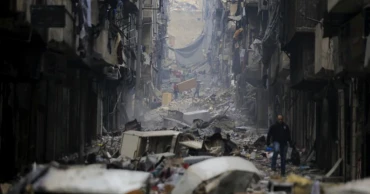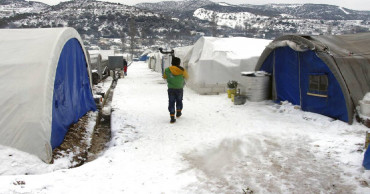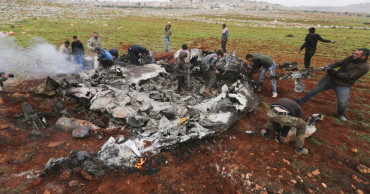Aleppo
Syria sends in reinforcements to halt insurgents from advancing after seizing Aleppo
The Syrian military rushed in reinforcements Sunday to push back insurgents from advancing farther into the northern Hama countryside after they seized Aleppo and surrounding strategic locations in an adjacent province in a surprise offensive.
The insurgents led by Hayat Tahrir al-Sham took over most of Aleppo on Saturday and claimed to have entered the city of Hama. There was no independent confirmation of their claim.
Rebel commander Col. Hassan Abdulghani said separately the insurgents also took control of Sheikh Najjar, also known as the Aleppo Industrial City, northeast of the city, Aleppo’s military academy and the field artillery college to the southwest.
Iranian Foreign Minister Abbas Araghchi travels to Syrian capital Damascus later Sunday. He told reporters that Tehran will back the Syrian government and army.
The swift and surprise offensive is a huge embarrassment for Syria’s President Bashar Assad and raises questions about his armed forces’ preparedness. It also comes at a time when Assad’s allies — Iran and groups it backs and Russia — are preoccupied with their own conflicts.
What to know about sudden rebel gains in Syria's long war
Syrian state television claimed government forces had killed nearly 1,000 insurgents over the past three days, without providing evidence or details.
Government airstrikes overnight on Idlib city, the rebel-held bastion near Hama province and 65 kilometers (40 miles) southeast of Aleppo, killed four civilians and wounded 54 others, according to the Syrian Civil Defense, also known as the White Helmets, that operates in opposition-held areas.
According to Syrian state news agency SANA and a war monitor, the army overnight pushed back insurgents in the northern countryside of Hama province.
Britain-based opposition war monitor the Syrian Observatory for Human Rights said that government reinforcements created a “strong defensive line” in the northern Hama countryside.
The observatory and Syrian state-run news network Al-Ikhbariyah also reported Russian airstrikes, both in Idlib and some of the areas now under rebel control.
In his first public comments since the start of the offensive, released by the state news agency Saturday evening, Assad said Syria will continue to “defend its stability and territorial integrity against terrorists and their supporters.” He added that Syria is able to defeat them no matter how much their attacks intensify.
Israel says it struck Hezbollah weapons smuggling sites in Syria, testing a fragile ceasefire
The 2016 battle for Aleppo was a turning point in the war between Syrian government forces and rebel fighters after 2011 protests against Assad’s rule turned into an all-out war.
After appearing to be losing control of the country to the rebels, the Aleppo battle secured Assad’s hold on strategic areas of Syria, with opposition factions and their foreign backers controlling areas on the periphery.
1 year ago
What to know about sudden rebel gains in Syria's long war
Syria's 13-year-long civil war has resurfaced dramatically in global headlines with a surprise rebel assault on Aleppo, a city of historic and economic significance.
This marks one of the most significant offensives by opposition forces in years and underscores the potential for renewed instability with repercussions beyond Syria's borders.
Aleppo, Syria's second-largest city — a key economic and cultural hub, was last attacked by rebels in 2016. That offensive ended with President Bashar Assad regaining control through a devastating campaign backed by Russian airstrikes.
Since then, Assad has consolidated power over 70% of Syria, aided by Russian, Iranian, and Hezbollah forces. The rebel assault signals a potential shift in the longstanding stalemate.
The timing is particularly fraught as the Middle East grapples with multiple crises, including the conflict in Gaza and rising tensions involving Hezbollah in Lebanon.
Former U.S. Ambassador to Syria, Robert Ford, attributed the rebel resurgence partly to Israeli airstrikes on Syrian and Hezbollah targets, along with a ceasefire between Israel and Hezbollah in Lebanon.
Why Aleppo matters
Aleppo has long been central to Syria's civil war, which has claimed over half a million lives and displaced millions. Nearly 6.8 million Syrians have fled the country, creating a refugee crisis that has reshaped political landscapes in Europe.
While Assad holds most of the country, around 30% remains under the control of rebel groups and foreign forces. U.S. troops stationed in northeastern Syria focus on preventing an ISIS resurgence, far from Aleppo.
Displaced Lebanese families return home faced with piles of rubble
Both the U.S. and Israel occasionally strike Syrian and Iran-backed militias. Turkey, too, maintains forces in Syria and has ties to the rebel coalition leading the Aleppo assault.
Charles Lister, a Syria expert with the Middle East Institute, suggested that the battle for Aleppo could significantly alter the balance of power if Assad's forces fail to retain control.
He also warned that the situation might encourage ISIS to exploit the chaos. Furthermore, direct confrontations between Russia and Turkey, each pursuing its own goals in Syria, could escalate regional tensions.
Who are the rebels?
The offensive is led by Hayat Tahrir al-Sham (HTS), a group previously linked to al-Qaida and designated a terrorist organization by the U.S. and U.N. HTS leader Abu Mohammed al-Golani initially aligned with al-Qaida but later broke ties in 2016.
The group has sought to project a more moderate image, emphasizing local governance and interfaith tolerance in its territories.
Golani has faced criticism for harboring extremist elements and engaging in past attacks on Western forces. However, he has also clamped down on radical factions and allowed some religious freedoms, such as permitting Christian Masses in Idlib.
Aleppo’s role in the conflict
Aleppo, a city of immense historical and commercial value, once housed 2.3 million residents. The eastern part of the city fell to rebels in 2012, symbolizing their initial strength. However, a Russian-backed siege in 2016 devastated the city, forcing the rebels to surrender.
Netanyahu supports ceasefire proposal with Hezbollah
Recent Israeli airstrikes in Aleppo targeting Hezbollah and Syrian forces add another layer of complexity, suggesting a broader regional context to the renewed fighting.
Source: With inputs from agencies
1 year ago
Earthquake stuns Syria's Aleppo even after war's horrors
For years, the people of Aleppo bore the brunt of bombardment and fighting when their city, once Syria’s largest and most cosmopolitan, was among the civil war’s fiercest battle zones. Even that didn’t prepare them for the new devastation and terror wreaked by this week’s earthquake.
The natural disaster piled on many human-made ones, multiplying the suffering in Aleppo and Syria more broadly.
Fighting largely halted in Aleppo in 2016, but only a small number of the numerous damaged and destroyed buildings had been rebuilt. The population has also more recently struggled with Syria's economic downslide, which has sent food prices soaring and residents thrown into poverty.
The shock of the quake is all too much.
Hovig Shehrian said that during the worst of the war in Aleppo, in 2014, he and his parents fled their home in a front-line area because of the shelling and sniper fire. For years, they moved from neighborhood to neighborhood to avoid the fighting.
“It was part of our daily routine. Whenever we heard a sound, we left, we knew who to call and what to do,” the 24-year-old said.
“But … we didn’t know what to do with the earthquake. I was worried we were going to die.”
Monday’s pre-dawn 7.8-magnitude quake, centered about 70 miles (112 kilometers) away in Turkey, jolted Aleppans awake and sent them fleeing into the street under a cold winter rain. Dozens of buildings across the city collapsed. More than 360 people were killed in the city and hundreds of others were injured. Workers were still digging three days later through the rubble, looking for the dead and the survivors. Across southern Turkey and northern Syria, more than 11,000 were killed.
Even those whose buildings still stood remain afraid to return. Many are sheltering in schools. A Maronite Christian monastery took in more than 800 people, particularly women, children and the elderly, crammed into every room.
“Until now we are not sleeping in our homes. Some people are sleeping in their cars,” said Imad al-Khal, the secretary-general of Christian denominations in Aleppo, who was helping organize shelters.
For many, the earthquake was a new sort of terror — a shock even after what they endured during the war.
For Aleppo, the war was a long and brutal siege. Rebels captured the eastern part of the city in 2012, soon after Syria’s civil war began. For the next years, Russian-backed government forces battled to uproot them.
Syrian and Russian airstrikes and shelling flattened entire blocks. Bodies were found in the river dividing the two parts of the city. On the government-held western side, residents faced regular mortar and rocket fire from opposition fighters.
A final offensive led to months of urban fighting, finally ending in December 2016 with government victory. Opposition fighters and supporters were evacuated, and government control imposed over the entire city. Activist groups estimate some 31,000 people were killed in the four years of fighting, and almost the entire population of the eastern sector was displaced.
Aleppo became a symbol of how President Bashar Assad succeeded in clawing back most opposition-held territory around Syria’s heartland with backing from Russia and Iran at the cost of horrific destruction. The opposition holds a last, small enclave in the northwest, centered on Idlib province and parts of Aleppo province, which was also devastated by Monday’s quake.
But Aleppo never recovered. Any reconstruction has been by individuals. The city’s current population remains well below its pre-2011 population of 4.5 million. Much of the eastern sector remains in ruins and empty.
Buildings damaged during the war or built shoddily during the fighting regularly collapse. One collapse, on Jan. 22, left 16 people dead. Another in September killed 11 people, including three children.
Aleppo was once the industrial powerhouse of Syria, said Armenak Tokmajyan, a non-resident fellow at Carnegie Middle East who is originally from the city. Now, he said, it’s economically marginalized, basic infrastructure in gas and electricity is lacking, and its population – which had hoped for improvements after fighting ended – only saw things get worse.
They have also now experienced the physical — and psychological — blow of the earthquake, Tokmajyan said. “It left them wondering, do they really deserve this fate or not? I think the trauma is big and it will take some time until they swallow this really bitter pill after (more than) 10 years of war.”
Rodin Allouch, an Aleppo native, covered the war for a Syrian TV station.
“I used to be on the front line, getting video shots, getting scoops. I was never scared. Rockets and shells were falling and everything, but my morale was high,” he recalled.
The earthquake was different. “I don’t know what the earthquake did to us exactly. We felt we were going to join God. It was the first time in my life I got scared.”
During the war, he had to leave his neighborhood in the eastern sector and rent an apartment on the western side. But the quake has displaced him yet again. As their building shook, he, his wife and four children fled to a nearby garden. Allouch said he won't return until the building is inspected and repaired. It still stands, but has many cracks. The family will instead stay in a ground-floor store front nearby that he rented.
“It is safer to be down (on ground floor) if there is an earthquake,” he said, but complained that there is no fuel for heating. “Life is so miserable."
Many others in Aleppo have been displaced more than once.
Farouk al-Abdullah fled his farm south of Aleppo city during the war. Since then, he has been living with his two wives, 11 children and 70-year-old mother in Jenderis, an opposition-held town in Aleppo province.
Their building there collapsed completely in the earthquake, though the entire family was able to escape.
He said the earthquake, with its destruction everywhere and its aftermath — watching rescue crews pull bodies out of the rubble — “are much more horrible than during the war."
And while war may be senseless, those in it often have a cause they are sacrificing for and wrest some meaning out of the death and destruction.
The war’s devastation in Aleppo at least “is somehow a proof that we weren’t defeated easily,” said Wissam Zarqa, an opposition supporter from the city who was there throughout the siege and now lives in the Turkish capital Ankara.
“But the destruction of natural disasters is all pain and nothing else but pain.”
3 years ago
Freezing weather compounds crisis for displaced in Syria
A military offensive on an opposition-controlled region of northwestern Syria has created one of the worst catastrophes for civilians in the country's long-running war, sending hundreds of thousands of people fleeing, many of them sleeping in open fields and under trees in freezing temperatures.
6 years ago
Military, activists: Syrian helicopter shot down in Aleppo
A government helicopter was shot down and its crew killed Friday in Syria's northwest, where a military offensive against opposition fighters is unfolding, a Syrian military official and activists said.
6 years ago









